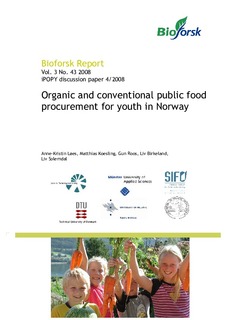| dc.description.abstract | In Norway, public procurement of food to youth is not well developed in comparison to many other European and Scandinavian countries. School meals are only offered in very few primary schools, and the common school meal is a packed lunch (sandwiches) brought from home, consumed in the class room. Subscription schemes for milk were introduced around 1970, and for fruit around 1995. Organic milk and fruit is offered only in some regions. Since 2007, fruit is served without payment in all schools with a lower secondary level (class 8-10 or 1-10). This effort was introduced as a first step to develop a free school meal in all public schools, which is a goal of one of the political parties in the current government. As in many other European countries, free school meals were offered (especially to poor children) in schools in the larger Norwegian cities around 1900. However, these meals were criticised for being unhealthy, and replaced by whole grain bread, milk and vegetables around 1930. Increasing private wealth, and increased demand for investments in school buildings, books etc changed the public priority and free school meals disappeared in Oslo around 1960. Today, there is not a general agreement about the optimal school meal composition, and whether or not the meals should be funded by the public. However, the increasing length of the school day and unsatisfactory scores of Norwegian pupils in international comparison tests (e.g. PISA) makes the school meal sector highly relevant in the public debate. Three cases that will be studied in a research project about public organic food procurement for youth are briefly described: The municipality of Trondheim, Øya music festival in Oslo and the Air Force Academy. (Increased) serving of organic food is an important aim in all these cases, and young people are an important target group. The report is produced within the project “innovative Public Organic food Procurement for Youth”, iPOPY, and will be updated and revised during the project period (2007-2010). | nb_NO |
